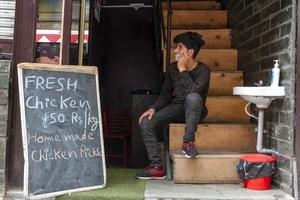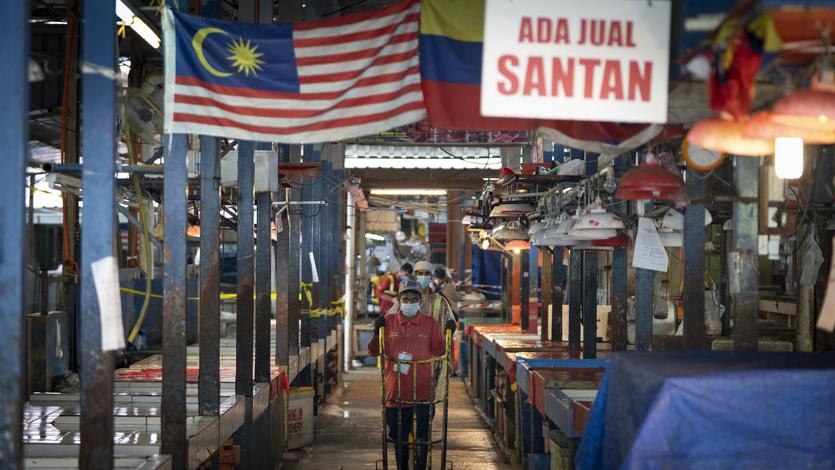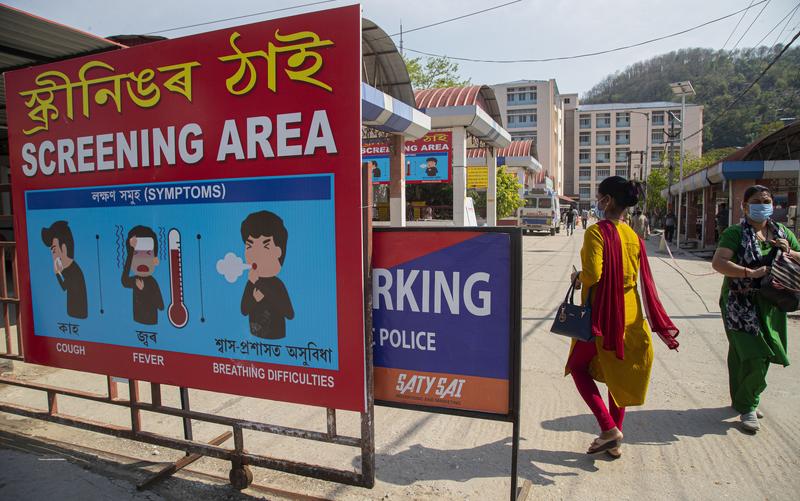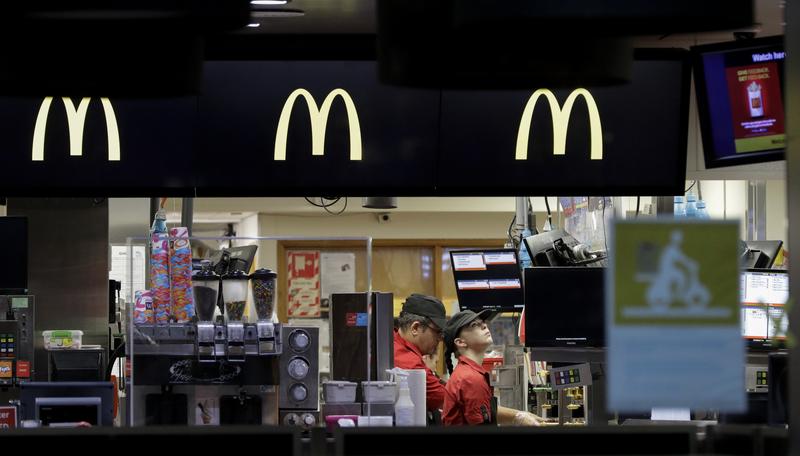 A boy wears a mask and sits outside a shop selling chicken products during a relaxation in the curfew imposed to check the spread of coronavirus in Dharmsala, India, May 2, 2020. (ASHWINI BHATIA/AP)
A boy wears a mask and sits outside a shop selling chicken products during a relaxation in the curfew imposed to check the spread of coronavirus in Dharmsala, India, May 2, 2020. (ASHWINI BHATIA/AP)
KUALA LUMPUR / ADEN / BISHKEK / SUVA / NEW DELHI / SEOUL / WELLINGTON / JERUSALEM / SINGAPORE / NEW DELHI — India will extend its nationwide lockdown by two weeks from May 4 but will ease restrictions in some areas to revive economic activity that’s been stalled since the stringent stay-at-home orders were put in place across the country on March 25.
Movement between states won’t allowed during the lockdown, although authorities will partially relax measures in areas where there’s been no new reports of coronavirus infections, the Ministry of Home Affairs said in a statement on Friday.
Industrial establishments in urban areas, including special economic zones, will be allowed to operate, as well as manufacturing units for essential goods, including drugs, pharmaceuticals and medical devices and IT hardware production, the ministry said. Private offices and government departments can operate with 33 percent capacity.
India has mandated that all public and private sector employees use a government-backed Bluetooth tracing app and maintain social distancing in offices as New Delhi begins easing some of its lockdown measures
The number of new infections being reported in the country has not fallen despite the 40-day lockdown. India had reported just over 600 infections and 10 deaths on March 25 when the strict curbs came into effect. It reported the biggest single-day spike on May 1, recording as many as 2,400 new cases, according to data from Johns Hopkins University. Those numbers now stand at over 37,000 infections and more than 1,200 deaths.
As New Delhi began easing some of its lockdown measures, the government has mandated that all public and private sector employees use a government-backed Bluetooth tracing app and maintain social distancing in offices.
As part of its efforts to fight the deadly virus, India last month launched the app Aarogya Setu - meaning Health Bridge - a Bluetooth and GPS-based system developed by the country’s National Informatics Centre. The app alerts users who may have come in contact with people later found to be positive for COVID-19 or deemed to be at high risk.
“Use of Aarogya Setu shall be made mandatory for all employees, both private and public,” India’s Ministry of Home Affairs said in a notification late on Friday.
It will the responsibility of the heads of companies and organizations “to ensure 100% coverage of this app among the employees,” the ministry said.
Singapore
Singapore will start easing some curbs put in place to contain the spread of the coronavirus over the next few weeks, authorities said on Saturday, as the city-state takes the first tentative steps towards reopening its economy.
Selected activities such as home-based businesses, laundry services and barbers will be allowed to operate from May 12. Some students will be allowed to go back to schools in small groups from May 19
Selected activities such as home-based businesses, laundry services and barbers will be allowed to operate from May 12. Some students will be allowed to go back to schools in small groups from May 19.
Some work premises will be allowed to gradually reopen, taking into account their importance to the economy and supply chains and their ability to minimise risks of transmission.
Singapore is facing the deepest recession in its 55-year history, compounded by restrictions called ‘circuit breakers’ due to last until June 1, which include the closure of most workplaces and shops.
“We are preparing for the safe and gradual resumption of economic and community activities after the end of the circuit breaker period on 1 June 2020,” the ministry of health said in a statement.
Singapore has among the highest number of infections in Asia, mainly due to outbreaks in cramped migrant workers dormitories. It has managed to curb the spread of the disease among locals outside the dormitories.
It reported 932 new coronavirus cases on Friday, taking its total infections to 17,101 and has suffered 16 virus-related deaths.
Australia
A small coronavirus cluster has emerged at a meat factory in the Australian state of Victoria, health officials said on Saturday, as parts of the country started easing social distancing restrictions after suppressing the infection rate to below 1 percent.
Australia and neighbouring New Zealand, which have closed borders and imposed lockdowns and tight social restrictions, have been hailed for containing COVID-19 outbreaks, but the measures are set to push both economies into recession.
Over the past week Australia has recorded an average of only 13 new cases each day, the health ministry said.
Local clusters of COVID-19 and cruise ships infections have accounted for a large percentage of Australia’s nearly 6,800 cases and 93 deaths.
New Zealand
New Zealand, which had imposed a total lockdown for all its ciitzens, recorded one new death on Saturday, bringing the toll to 20. There were two new confirmed cases of COVID-19 infections on Saturday, that raised the total to 1,134.

Workers push trolley at a locked down wet market as one of its traders tested positive for COVID-19 in Kuala Lumpur, Malaysia, April 29, 2020. (VINCENT THIAN / AP)
Malaysia
Malaysian authorities are rounding up undocumented migrants as part of efforts to contain the spread of coronavirus, the country’s police chief said late on Friday, after hundreds of migrants and refugees were detained in the capital Kuala Lumpur.
Over 700 migrants were taken into custody, including young children and ethnic Rohingya refugees from Myanmar
Over 700 migrants were taken into custody, including young children and ethnic Rohingya refugees from Myanmar, during Friday’s raid in a downtown area where thousands of migrants and asylum-seekers live, rights groups had said.
The operation was aimed at preventing undocumented migrants from travelling to other areas amid movement curbs imposed to contain the spread of the outbreak, Inspector-General of Police Abdul Hamid Bador told state news agency Bernama.
“We cannot allow them to move freely... as it will be difficult for us to track them down if they leave identified locations,” Abdul Hamid was quoted as saying.
Those detained would be placed at a single location for monitoring until the movement curbs were lifted, he said according to Bernama.
The arrests followed public anger in recent days over the presence of migrant foreigners, particularly Rohingya refugees, with some in Malaysia accusing them of spreading the coronavirus and being a burden on state resources.
Malaysia has around 2 million registered foreign workers but authorities estimate many more are living in the Southeast Asian country without proper documents. Malaysia does not formally recognise refugees, regarding them as illegal migrants.
Malaysia reported 105 new coronavirus cases on Saturday, bringing the total number of infections in the country to 6,176.
The number of deaths remained at 103, unchanged from Friday.
Kyrgyzstan
Kyrgyzstan reported 13 new COVID-19 cases on Saturday, bringing the total number to 769.
Head of the Public Health Department of the Health Ministry Ainura Akmatova told a news briefing that the newly infected people include two medical workers.
In total, 200 coronavirus cases were registered among medical workers, with 122 recoveries, said Akmatova
In total, 200 coronavirus cases were registered among medical workers, with 122 recoveries, said Akmatova.
Currently, she added, there are 234 COVID-19 patients in hospitals in Kyrgyzstan, with 11 of them in serious condition, and five in intensive care.
Akmatova said that another 23 infected patients were discharged from hospitals over the past day.
In total, 527 have been discharged from hospitals throughout the country, and eight deaths have been reported.
Philippines
The Philippines said on Saturday it has recorded 156 new cases of the novel coronavirus and 24 more deaths, bringing the total number of infections in the country to 8,928 and the fatalities to 603.
It also said that 40 more individuals had recovered from infections, bringing the recoveries to 1,124.
Indonesia
Indonesia recorded 292 new coronavirus cases on Saturday, taking the total number of infections to 10,843, said health ministry official, Achmad Yurianto.
Yurianto also reported 31 new deaths, taking the total number of fatalities to 831. The number of people who have recovered from COVID-19, the disease caused by the coronavirus, rose by 74 to 1,665, he said.
The country has tested more than 79,800 people for the virus, he said.
South Korea
South Korea reported six more cases of the COVID-19 compared to 24 hours ago as of 0:00 a.m. Saturday local time, raising the total number of infections to 10,780.
The daily caseload hovered below 20 for 15 straight days. All the new cases were imported, lifting the combined number to 1,081.
 Indian women wearing masks walk past a COVID-19 screening area in Guwahati Medical College Hospital (GMCH) in Gauhati, India, May 1, 2020. (ANUPAM NATH / AP)
Indian women wearing masks walk past a COVID-19 screening area in Guwahati Medical College Hospital (GMCH) in Gauhati, India, May 1, 2020. (ANUPAM NATH / AP)
India
India's federal health ministry Saturday said 66 new deaths due to COVID-19, besides additional 1,971 positive cases were reported since Friday evening across the country, taking the number of deaths to 1,218 and total cases to 37,336.
"As on 8:00 am local time today, 1,218 deaths related to novel coronavirus have been recorded in the country," reads the information released by the ministry.
Israel
The number of COVID-19 cases in Israel has risen to 16,101 after 155 new cases were added on Friday, the state's Ministry of Health said.
The number of recoveries jumped to 9,156, with 595 new recoveries, while the number of active cases dropped to 6,720, the lowest figure since April 2
According to the ministry, the number of death cases rose from 222 to 225, while the number of patients in serious condition decreased from 105 to 103 out of 299 patients currently hospitalized.
The number of recoveries jumped to 9,156, with 595 new recoveries, while the number of active cases dropped to 6,720, the lowest figure since April 2.
Earlier on Friday, the Israeli government decided to partially reopen schools starting from May 3 with distance restrictions between pupils and hygiene measures.
The decision includes the resumption of first grade through third grade classes, as well as 11th and 12th grade classes.
If the reassuring morbidity figures continue in the coming days, kindergartens will also reopen on May 10.
New Zealand
New Zealand reported one more death case of COVID-19, adding the total death number of COVID-19 in the country to 20, the Ministry of Health said on Saturday.
A man in his 80s passed away early Saturday in a Christchurch Hospital. He was previously a resident of Rosewood Rest Home where there was a cluster outbreak of COVID-19. The man was considered to be a probable case of COVID-19, and also had underlying health conditions, said the Ministry of Health in a statement.
Meanwhile, New Zealand reported two new confirmed cases of COVID-19 and four new probable cases. Five of these cases can be traced to a known source. One case is still being investigated.
 Fast food restaurant workers prepare food for drive-through customers as level four COVID-19 restrictions are eased in Christchurch, New Zealand, April 28, 2020. (MARK BAKER / AP)
Fast food restaurant workers prepare food for drive-through customers as level four COVID-19 restrictions are eased in Christchurch, New Zealand, April 28, 2020. (MARK BAKER / AP)
The combined total of confirmed and probable cases in New Zealand is 1,485, including 1,134 confirmed cases. Currently, there are 1,263 people being recovered from COVID-19, while only five people are in hospital.
Fiji
Two more patients in Fiji have recovered from COVID-19, with only four cases now active in the island nation.
Fijian Prime Minister Voreqe Bainimarama reminded Fijians that the nationwide curfew, which started from March 30, remains from 10:00 pm to 5:00 am, social gatherings should be 20 people or less and people should continue to practise social distancing.
Yemen
Yemen reported the first case of the novel coronavirus in a third province on Friday, raising the number of diagnosed infections to seven with two deaths in one of the world’s most vulnerable countries.
The United Nations says it fears the virus could be spreading undetected in the country where a five-year war has shattered health systems and left millions acutely malnourished.
Yemen recorded its first case of COVID-19 in southern Hadharamout province on April 10
Yemen recorded its first case of COVID-19 in southern Hadharamout province on April 10. On Wednesday, it announced five infections in the southern port of Aden, with two deaths.
Yemen is already grappling with the world’s largest humanitarian crisis caused by the war between a Saudi-led coalition and the Houthi group that ousted the government from power in the capital, Sanaa, in late 2014.
The World Health Organisation has said it fears the worst about the COVID-19 impact in Yemen as its population has some of the lowest levels of immunity and most acute vulnerability to disease compared with other countries.
Around 80 percent of the population, or 24 million people, rely on humanitarian aid and 10 million are at risk of starvation. Disease is rife and some like dengue fever share the same symptoms as the novel coronavirus, making it harder to detect.
Yemen is also split into rival power centres. On Wednesday the Aden-based government’s emergency coronavirus committee voiced concern that Houthi officials were not admitting to a coronavirus outbreak in Sanaa. The group’s health authorities said all suspected cases there had tested negative for COVID-19.


